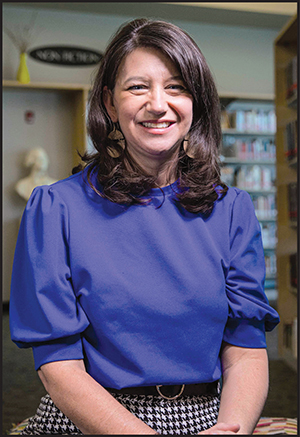Amy Taylor | Movers & Shakers 2023—Advocates
When Missouri’s Department of Elementary and Secondary Education stopped gathering data on school library collections, Amy Taylor found herself talking to others equally concerned with the loss of the information school libraries needed to advocate for funding. While public libraries have a legislative committee to lobby at the state level, no school library advocacy committee existed. Taylor stepped up to chair a task force studying how school librarians could raise awareness of what they do.
 |
CURRENT POSITIONCoordinator of Library and Media Services, Lee’s Summit R7 School District, MO DEGREEMLIS, Emporia State University, KS, 2011 FAST FACTTaylor is a news junkie and does the NYT News Quiz every week. If she gets 100 percent, she takes a screenshot. FOLLOWlinkedin.com/in/amy-taylor-lms Photo by Rebekah Hange |
Legislating for School Librarians
When Missouri’s Department of Elementary and Secondary Education stopped gathering data on school library collections (e.g., number or age of books), Amy Taylor found herself talking to others equally concerned with the loss of the information school libraries needed to advocate for funding. While public libraries have a legislative committee to lobby at the state level, no school library advocacy committee existed. Taylor stepped up to chair a task force studying how school librarians could raise awareness of what they do.
One of the Advocacy Task Force’s first efforts was a billboard in Jefferson City, located where legislators would see it on their way to the capitol, reading “Missouri school libraries transform because they provide students with access to books, technology, and so much more.” The Task Force then worked with a lobbyist to push for a bill that would officially define the role of school librarians in Missouri. The group also succeeded in establishing a state-level award of excellence to recognize outstanding school libraries. The Missouri Exemplary School Library Program is now in its third year.
Taylor had another plan: Revamping the state’s school librarian certification program. She wanted to find a route to certification that adequately prepared aspiring librarians for the job but wouldn’t be cost-prohibitive. “We didn’t want to create a barrier for people who wanted to become librarians but couldn’t afford that,” she says. The certification Taylor proposed provides affordable foundational courses to prepare them for entry-level library careers without requiring a full LIS program. The new requirement went into effect in 2021.
“I’m incredibly proud of that work,” she says. “There’s meat behind that certification.”
RELATED
ALREADY A SUBSCRIBER? LOG IN
We are currently offering this content for free. Sign up now to activate your personal profile, where you can save articles for future viewing










Add Comment :-
Comment Policy:
Comment should not be empty !!!